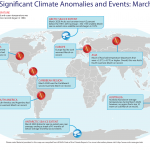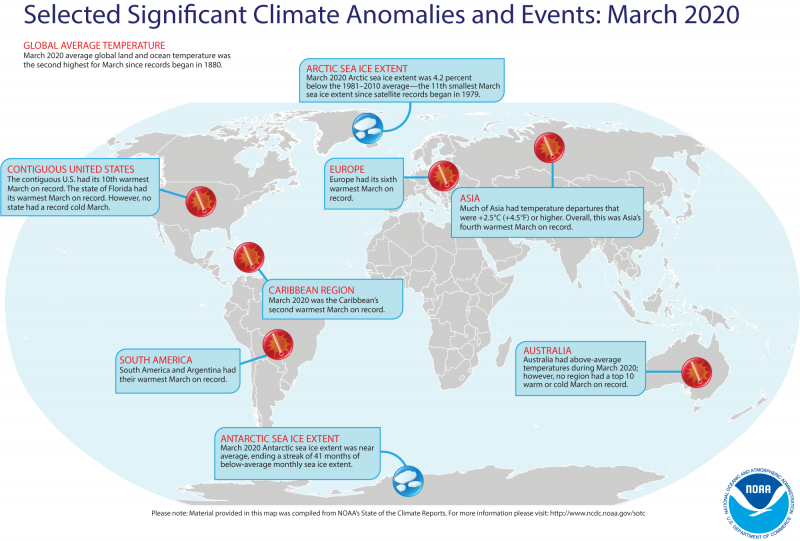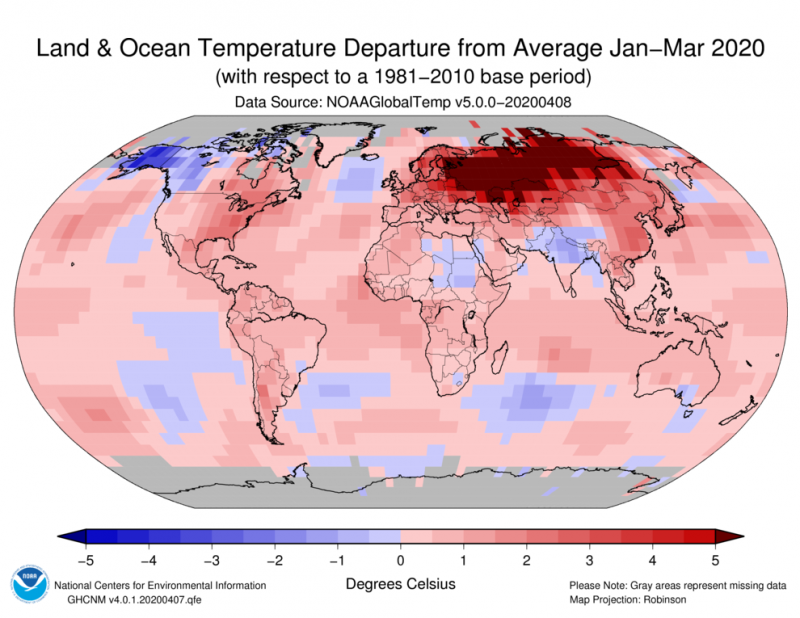

View larger. | A map of the world noting some of the most significant weather and climate events that occurred during March 2020. More details about this image here. Image via NOAA.
After having a record-hot January and its second-hottest February this year, Earth continued to endure unrelenting heat last month, making March 2020 the second-hottest March in 141 years of climate records. According to a report by NOAA’s National Centers for Environmental Information (NCEI) released Monday (April 13, 2020), the three-month start to 2020 was also the second-hottest year to date (January through March) ever recorded for the globe,
A statistical analysis done by NCEI scientists suggests that 2020 is very likely to rank among the five warmest years on record.
NOAA records say the average global land and ocean-surface temperature for March 2020 was 2.09 degrees F (1.16 degrees C) above the 20th-century average and the second-highest March temperature on record ,after 2016.
The 10 warmest Marches have all occurred since 1990, according to NOAA records. This past March was the 44th consecutive March and the 423rd consecutive month with temperatures above the 20th-century average.

View larger. | The global land and ocean-surface temperature of 2.07 degrees F (1.15 degrees C) above the 20th-century average made it the second-warmest January-through-March period in the 141-year record, behind 2016. The year to date logged in as second-warmest for both the Northern and Southern Hemispheres, while Europe and Asia had their warmest YTD ever recorded. Image via NOAA.
Bottom line: March 2020 was Earth’s second-hottest March on record. January through March 2020 was also our planet’s second-hottest year to date in the climate record dating back to 1880, according to a NOAA report.
See NOAA’s full March 2020 climate report here.
from EarthSky https://ift.tt/2RHQJhU


View larger. | A map of the world noting some of the most significant weather and climate events that occurred during March 2020. More details about this image here. Image via NOAA.
After having a record-hot January and its second-hottest February this year, Earth continued to endure unrelenting heat last month, making March 2020 the second-hottest March in 141 years of climate records. According to a report by NOAA’s National Centers for Environmental Information (NCEI) released Monday (April 13, 2020), the three-month start to 2020 was also the second-hottest year to date (January through March) ever recorded for the globe,
A statistical analysis done by NCEI scientists suggests that 2020 is very likely to rank among the five warmest years on record.
NOAA records say the average global land and ocean-surface temperature for March 2020 was 2.09 degrees F (1.16 degrees C) above the 20th-century average and the second-highest March temperature on record ,after 2016.
The 10 warmest Marches have all occurred since 1990, according to NOAA records. This past March was the 44th consecutive March and the 423rd consecutive month with temperatures above the 20th-century average.

View larger. | The global land and ocean-surface temperature of 2.07 degrees F (1.15 degrees C) above the 20th-century average made it the second-warmest January-through-March period in the 141-year record, behind 2016. The year to date logged in as second-warmest for both the Northern and Southern Hemispheres, while Europe and Asia had their warmest YTD ever recorded. Image via NOAA.
Bottom line: March 2020 was Earth’s second-hottest March on record. January through March 2020 was also our planet’s second-hottest year to date in the climate record dating back to 1880, according to a NOAA report.
See NOAA’s full March 2020 climate report here.
from EarthSky https://ift.tt/2RHQJhU

Aucun commentaire:
Enregistrer un commentaire